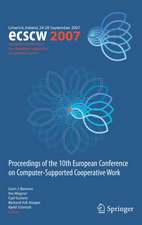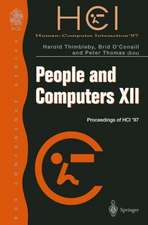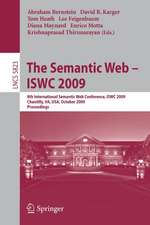Cooperative Work and Coordinative Practices: Contributions to the Conceptual Foundations of Computer-Supported Cooperative Work (CSCW): Computer Supported Cooperative Work
Autor Kjeld Schmidten Limba Engleză Paperback – 21 apr 2013
| Toate formatele și edițiile | Preț | Express |
|---|---|---|
| Paperback (1) | 996.40 lei 6-8 săpt. | |
| SPRINGER LONDON – 21 apr 2013 | 996.40 lei 6-8 săpt. | |
| Hardback (1) | 1002.99 lei 6-8 săpt. | |
| SPRINGER LONDON – 9 feb 2011 | 1002.99 lei 6-8 săpt. |
Din seria Computer Supported Cooperative Work
- 20%
 Preț: 1044.25 lei
Preț: 1044.25 lei - 20%
 Preț: 650.59 lei
Preț: 650.59 lei - 20%
 Preț: 647.61 lei
Preț: 647.61 lei - 20%
 Preț: 638.55 lei
Preț: 638.55 lei - 20%
 Preț: 334.53 lei
Preț: 334.53 lei - 20%
 Preț: 328.79 lei
Preț: 328.79 lei - 20%
 Preț: 334.71 lei
Preț: 334.71 lei - 20%
 Preț: 330.90 lei
Preț: 330.90 lei - 20%
 Preț: 328.79 lei
Preț: 328.79 lei - 20%
 Preț: 649.28 lei
Preț: 649.28 lei - 20%
 Preț: 643.50 lei
Preț: 643.50 lei - 20%
 Preț: 329.91 lei
Preț: 329.91 lei - 15%
 Preț: 642.83 lei
Preț: 642.83 lei - 20%
 Preț: 648.11 lei
Preț: 648.11 lei - 20%
 Preț: 647.79 lei
Preț: 647.79 lei - 20%
 Preț: 413.81 lei
Preț: 413.81 lei - 20%
 Preț: 336.02 lei
Preț: 336.02 lei - 20%
 Preț: 346.10 lei
Preț: 346.10 lei - 20%
 Preț: 330.24 lei
Preț: 330.24 lei - 20%
 Preț: 982.36 lei
Preț: 982.36 lei - 20%
 Preț: 329.11 lei
Preț: 329.11 lei - 20%
 Preț: 987.32 lei
Preț: 987.32 lei - 20%
 Preț: 641.34 lei
Preț: 641.34 lei - 20%
 Preț: 648.26 lei
Preț: 648.26 lei - 20%
 Preț: 995.89 lei
Preț: 995.89 lei - 20%
 Preț: 643.63 lei
Preț: 643.63 lei - 20%
 Preț: 988.98 lei
Preț: 988.98 lei - 20%
 Preț: 328.42 lei
Preț: 328.42 lei - 20%
 Preț: 988.81 lei
Preț: 988.81 lei - 20%
 Preț: 643.30 lei
Preț: 643.30 lei - 20%
 Preț: 987.17 lei
Preț: 987.17 lei - 20%
 Preț: 329.58 lei
Preț: 329.58 lei - 20%
 Preț: 309.58 lei
Preț: 309.58 lei - 20%
 Preț: 330.42 lei
Preț: 330.42 lei - 5%
 Preț: 365.82 lei
Preț: 365.82 lei - 20%
 Preț: 650.08 lei
Preț: 650.08 lei - 20%
 Preț: 334.38 lei
Preț: 334.38 lei - 20%
 Preț: 645.79 lei
Preț: 645.79 lei - 20%
 Preț: 650.40 lei
Preț: 650.40 lei - 20%
 Preț: 333.88 lei
Preț: 333.88 lei - 20%
 Preț: 1263.81 lei
Preț: 1263.81 lei - 20%
 Preț: 830.58 lei
Preț: 830.58 lei - 20%
 Preț: 704.70 lei
Preț: 704.70 lei
Preț: 996.40 lei
Preț vechi: 1245.50 lei
-20% Nou
Puncte Express: 1495
Preț estimativ în valută:
190.66€ • 199.60$ • 157.76£
190.66€ • 199.60$ • 157.76£
Carte tipărită la comandă
Livrare economică 05-19 aprilie
Preluare comenzi: 021 569.72.76
Specificații
ISBN-13: 9781447126317
ISBN-10: 1447126319
Pagini: 488
Ilustrații: XVI, 472 p.
Dimensiuni: 155 x 235 x 26 mm
Greutate: 0.68 kg
Ediția:2011
Editura: SPRINGER LONDON
Colecția Springer
Seria Computer Supported Cooperative Work
Locul publicării:London, United Kingdom
ISBN-10: 1447126319
Pagini: 488
Ilustrații: XVI, 472 p.
Dimensiuni: 155 x 235 x 26 mm
Greutate: 0.68 kg
Ediția:2011
Editura: SPRINGER LONDON
Colecția Springer
Seria Computer Supported Cooperative Work
Locul publicării:London, United Kingdom
Public țintă
ResearchCuprins
Preface.- Part I: Progress Report.- Cooperative work and coordinative practices.- Part II: Surveying the connections.- Riding a tiger, or CSCW(1991).- Taking CSCW seriously (1992).- The organisation of cooperative work (1994).- Coordination mechanisms (1996).- Of maps and scripts (1997).- The critical role of workplace studies in CSCW (2000).- The problem with 'awareness' (2002).- Remarks on the complexity of cooperative work (2002).- Ordering systems (2004).- Part III: CSCW reconsidered.- Formation and Fragmentation.- Frail foundations.- Dispelling the mythology of computational artifacts.- References.- Index.
Recenzii
From the reviews:
“A book dealing with the history of CSCW and technological development … . This is a valuable and informative piece of work. … this book contributes with a number of very interesting and thought-provoking discussions that force the reader to reflect and examine one’s own position. … I very much appreciate the extensive work that Schmidt has done on collaborative work, both empirically and theoretically, which I find fundamental and a must-read to researchers in the CSCW area.” (Maria Normark, Computer Supported Cooperative Work, Vol. 21, 2012)
“A book dealing with the history of CSCW and technological development … . This is a valuable and informative piece of work. … this book contributes with a number of very interesting and thought-provoking discussions that force the reader to reflect and examine one’s own position. … I very much appreciate the extensive work that Schmidt has done on collaborative work, both empirically and theoretically, which I find fundamental and a must-read to researchers in the CSCW area.” (Maria Normark, Computer Supported Cooperative Work, Vol. 21, 2012)
Textul de pe ultima copertă
The development of computing technologies have from the very beginning been tightly interwoven with the development of cooperative work, but over the last couple of decades, computing technologies are increasingly being developed and used for coordinative purposes, as a means of regulating complex activities involving multiple professional actors, in factories and hospitals, in pharmaceutical laboratories and architectural offices, and so on. The economic importance of the applications of these coordination technologies is enormous but their design often inadequate. The problem is that our understanding of the coordinative practices, for which these coordination technologies are being developed, is quite deficient, leaving systems designers and software engineers to base their system designs on rudimentary technologies.The research reflected in this book addresses these very problems. The book contains a series of articles that has played an important role in establishing the conceptual foundations of the research area of Computer-Supported Cooperative Work (CSCW). These articles are complemented by four new chapters in which CSCW’s research program is subjected to critical examination and clarification.
Caracteristici
Brings together both classic and less well known articles on the phenomena of cooperative work and coordinative practices Provides critical elements of the conceptual foundation of CSCW Includes research carried out in a number of European institutions
























